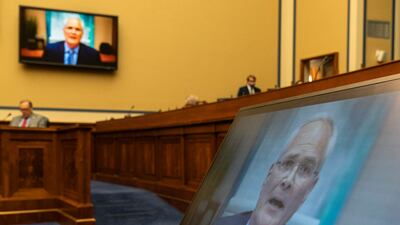ExxonMobil’s chief executive said on Thursday that his company “does not spread disinformation regarding climate change″ as he and other oil company chiefs countered congressional allegations the industry concealed evidence about the dangers of global warming.
Speaking at a House hearing, Darren Woods said ExxonMobil “has long acknowledged the reality and risks of climate change and it has devoted significant resources to addressing those risks".
The oil company's public statements on climate “are and have always been truthful, fact based … and consistent” with mainstream climate science, Mr Woods said.
Democrats immediately challenged the statements by Mr Woods and other oil executives, accusing them of engaging in a decades-long, industry-wide campaign to spread disinformation about the contribution of fossil fuels to global warming.
“They are obviously lying like the tobacco executives were,” said Carolyn Maloney, chairwoman of the House Oversight Committee.
She was referring to a 1994 hearing with tobacco executives who famously stated that they did not believe nicotine was addictive. The reference was one of several to the tobacco hearing as Democrats sought to pin down oil executives on whether they believe in climate change and that burning fossil fuels such as oil contributes to global warming.
The hearing comes after months of public efforts by Democrats to obtain documents and other information on the oil industry’s role in stopping climate action over multiple decades.
The fossil fuel industry has had scientific evidence about the dangers of climate change since at least 1977, yet spread denial and doubt about the harm of its products — undermining science and preventing meaningful action on climate change, Ms Maloney and other Democrats said.
“Do you agree that [climate change] is an existential threat? Yes or no?” Ms Maloney asked Shell Oil President Gretchen Watkins.
“I agree that this is a defining challenge for our generation, absolutely,” Ms Watkins replied.
Ms Watkins, Mr Woods and other oil executives said they agreed with Ms Maloney on the existence and threat posed by climate change, but they refused her request to pledge that their companies would not spend money — either directly or indirectly — to oppose efforts to reduce planet-warming greenhouse gas emissions.
“We’re pledging to advocate for low-carbon policies that do, in fact, take the company and the world to net-zero” carbon emissions, said BP America head David Lawler.
This is also the first time since BP’s Gulf of Mexico oil spill more than a decade ago that top industry executives have appeared together before Congress.
Ms Maloney said she hoped the hearing will help persuade oil executives to change their approach to climate change.
“I hope that after 40 years of misleading the public to block climate action, our nation’s oil and gas industry will finally change its behaviour and join the many good corporate citizens, community leaders and scientists who are working together to save our planet and our children,” she said.

“This hearing is just the start of our investigation,” added Ro Khanna, who leads a subcommittee on the environment.
“These companies must be held accountable.”
The committee released a memo on Thursday stating that the oil industry’s public support for climate reforms has not been matched by meaningful actions, and that the industry has spent billions of dollars to block reforms.
Ms Maloney and other Democrats have focused particular ire on Exxon, after a senior lobbyist for the company was caught in a secret video bragging that Exxon had fought climate science through “shadow groups” and had gone after influential senators in an effort to weaken President Joe Biden’s climate agenda.
That agenda includes a bipartisan infrastructure bill and a sweeping climate and social policy bill currently moving through Congress.
The probe comes as Mr Biden struggles to keep key climate policies in his spending bill, which is crucial to enacting the infrastructure goals that were a cornerstone of his campaign.
Moderate Democrats and Republicans are blocking large portions of Mr Biden’s climate efforts amid deep divisions within his own party before the Cop26 in Glasgow begins next week.
Mr Khanna pressed Ms Watkins and other executives to quit the American Petroleum Institute, which he said actively opposed government subsidies for electric vehicles. They declined to make such a commitment.
Agencies contributed to this report

